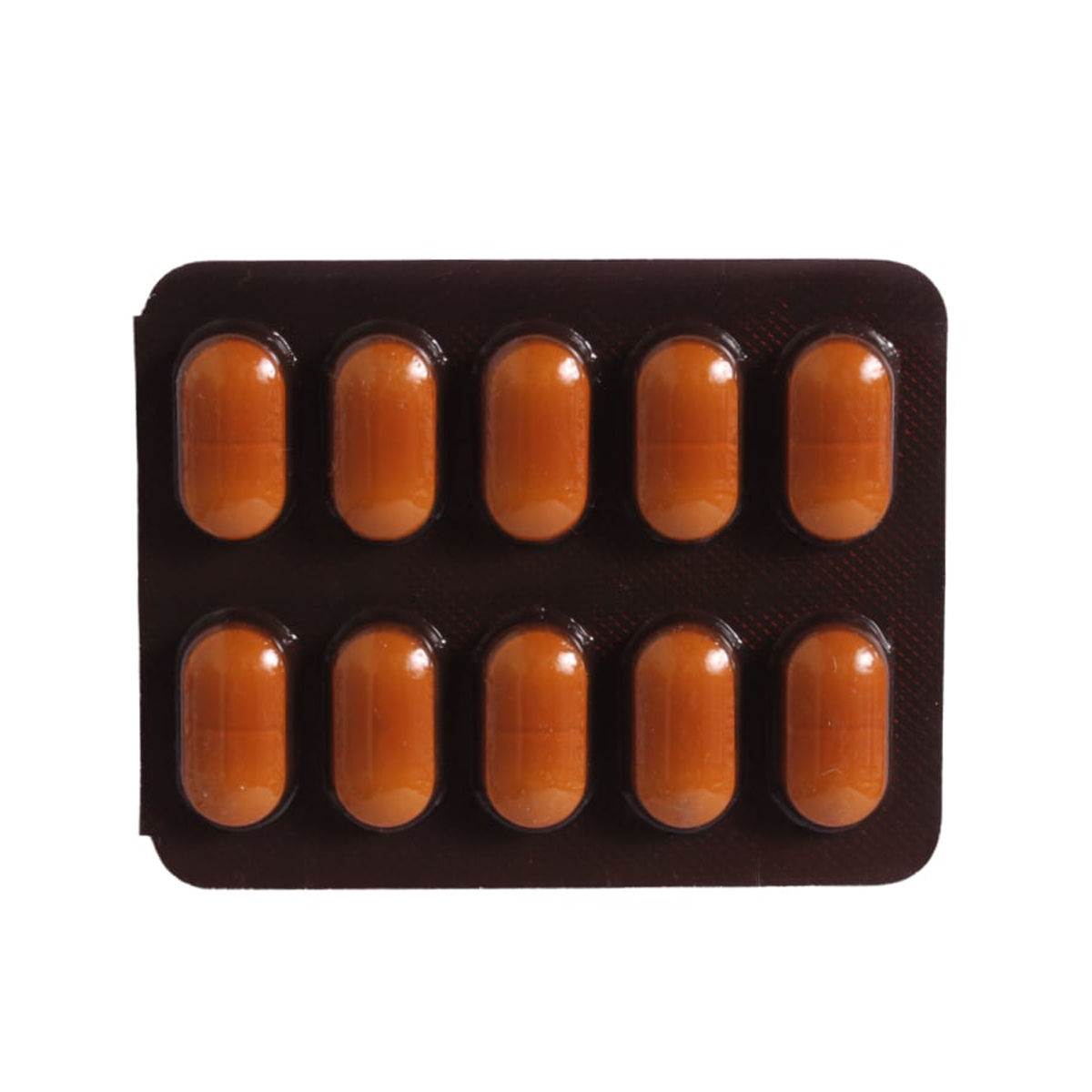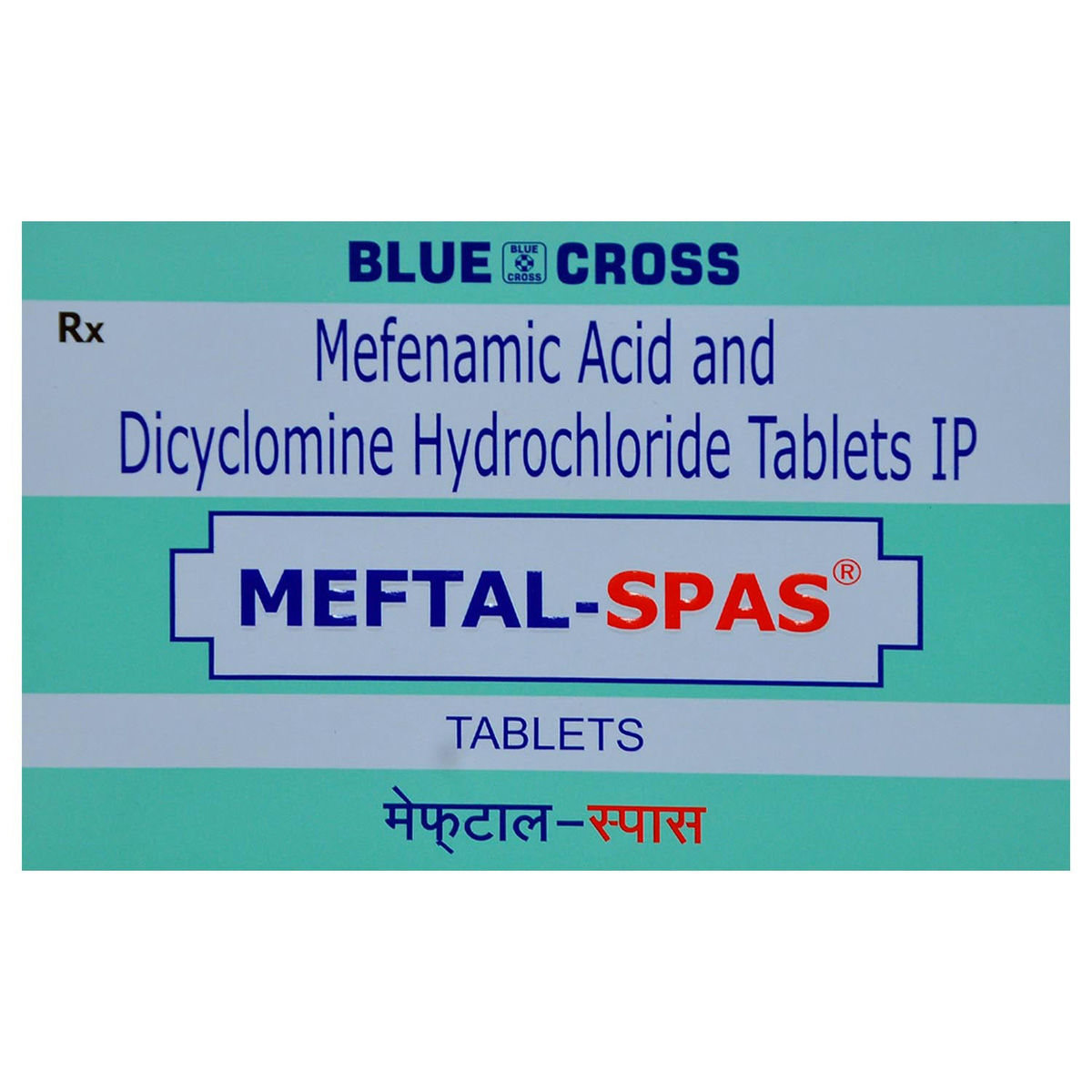Dicyclomine+mefenamic Acid
About Dicyclomine+mefenamic Acid
Dicyclomine+mefenamic Acid is used to treat abdominal pain, dysmenorrhea (period pain), and colicky pain. Abdominal (tummy) pain occurs between the chest and pelvic region (below the belly button and leg). Menstrual cramps, also known as dysmenorrhea, are characterised by cramps and pain during menstruation. A colic is a form of pain that starts and stops abruptly.
Dicyclomine+mefenamic Acid is a combination of two drugs: Dicyclomine (anti-spasmodic) and Mefenamic acid (NSAID). Dicyclomine works by relieving contractions associated with the smooth muscles of the abdomen. Mefenamic acid works by blocking the effect of chemical messengers called prostaglandins. This helps reduce mild to moderate pain and inflammation at the injured or damaged site. Together, Dicyclomine+mefenamic Acid helps in relieving pain.
You are advised to take Dicyclomine+mefenamic Acid as long as your doctor has prescribed it for you, depending on your medical condition. In some cases, Dicyclomine+mefenamic Acid may cause common side effects such as nausea, vomiting, diarrhoea, dry mouth, and weakness. Most of these side effects do not require medical attention and will resolve gradually over time. However, you are advised to talk to your doctor if you experience these side effects persistently.
Consult your doctor if you are pregnant or breastfeeding. Dicyclomine+mefenamic Acid may cause dizziness and drowsiness, so drive with caution. Dicyclomine+mefenamic Acid is not recommended for children as safety and efficacy have not been established. Avoid consuming alcohol with Dicyclomine+mefenamic Acid as it could lead to increased drowsiness and dizziness, it might also increase the risk of stomach bleeding. Keep your doctor informed about your health condition and medicines to rule out any side effects/interactions.
Uses of Dicyclomine+mefenamic Acid
Medicinal Benefits
Dicyclomine+mefenamic Acid is a combination of two drugs: Dicyclomine (anti-spasmodic) and Mefenamic acid (NSAID). Dicyclomine+mefenamic Acid is used to treat abdominal pain, dysmenorrhea (period pain), and colicky pain. Dicyclomine works by relieving contractions associated with the smooth muscles of the abdomen. Mefenamic acid works by blocking the effect of chemical messengers called prostaglandins. This helps reduce mild to moderate pain and inflammation at the injured or damaged site. Together, Dicyclomine+mefenamic Acid helps in relieving pain.
Directions for Use
Storage
Side Effects of Dicyclomine+mefenamic Acid
- Nausea
- Vomiting
- Diarrhoea
- Dizziness
- Headache
- Dry mouth
- Weakness
- Nervousness
- Loss of appetite
Drug Warnings
Do not take Dicyclomine+mefenamic Acid if you are allergic to any of its contents, if you have severe heart failure, or have suffered bleeding problems such as bleeding from the stomach or bowels while taking any painkillers. Inform your doctor if you have/had asthma, glaucoma, myasthenia gravis, high blood pressure, inflammatory bowel disease, paralytic ileus, intestinal atony, heart, kidney, or liver problems. Consult your doctor if you are pregnant or breastfeeding. Dicyclomine+mefenamic Acid may cause dizziness and drowsiness, so drive only if you are alert. Dicyclomine+mefenamic Acid should not be given to children as safety has not been established. Avoid consuming alcohol with Dicyclomine+mefenamic Acid as it could lead to increased drowsiness and can increase the risk of stomach bleeding. Stop taking Dicyclomine+mefenamic Acid and consult your doctor immediately if you have stomach pain or any signs of bleeding in the intestine or stomach, such as blood in stools. Do not take any other NSAIDs for pain relief along with Dicyclomine+mefenamic Acid unless prescribed.
Drug Interactions
Drug-Drug Interactions: Dicyclomine+mefenamic Acid may interact with pain killers (aspirin), diuretics (furosemide), anti-psychotics (lithium, quinidine, phenothiazine), anti-rheumatoid (methotrexate), blood thinners (warfarin), cardiac glycoside (digoxin), anti-diabetic (glibenclamide, gliclazide, glimepiride), antibiotic (gentamycin, tobramycin, amikacin, cyclosporine), anti-platelet (clopidogrel), steroid (mifepristone), immunosuppressant (tacrolimus), anti-HIV (zidovudine), and anti-emetic medications (metoclopramide).
Drug-Food Interactions: No interactions found/established.
Drug-Disease Interactions: Inform your doctor if you have peptic ulcers, bleeding disorders, asthma, glaucoma, myasthenia gravis, high blood pressure, inflammatory bowel disease, paralytic ileus, intestinal atony, heart, kidney, or liver problems.
Drug-Drug Interactions Checker List:
Safety Advice

Alcohol
unsafeAvoid consumption of alcohol while taking Dicyclomine+mefenamic Acid as it may cause increased drowsiness. It can also increase the risk of stomach bleeding.

Pregnancy
cautionPlease consult your doctor if you are pregnant or if you have any concerns regarding this; your doctor will prescribe only if the benefits outweigh the risks.

Breast Feeding
unsafeIt is not recommended to breastfeed while taking Dicyclomine+mefenamic Acid. Consult your doctor before taking Dicyclomine+mefenamic Acid if you are breastfeeding.

Driving
cautionDicyclomine+mefenamic Acid may cause drowsiness and dizziness. Do not drive or operate machinery unless you are alert.

Liver
cautionDose adjustment may be needed in patients with liver impairment. Please consult your doctor if you have a liver impairment or any concerns regarding this.

Kidney
unsafeDicyclomine+mefenamic Acid should not be used in patients with renal disease. Please consult your doctor if you have kidney impairment or any concerns regarding this.

Children
unsafeDicyclomine+mefenamic Acid is not recommended for children as safety and effectiveness were not established.
Habit Forming
Diet & Lifestyle Advise
Exercising regularly helps in muscle stretching so that they are less likely to spasm, tear and sprain. Mild exercises such as jogging and walking are helpful for muscle stretching.
Massages can also be helpful.
Avoid freezing and hot temperatures.
Avoid wearing tight-fitting clothes, instead, wear loose garments.
Rest well, and get plenty of sleep.
To avoid developing pressure sores, change your position every two hours.
Hot or cold therapy can help treat muscle spasms. Apply an ice-pack or hot-pack on the muscle for 15-20minutes.
Stay hydrated, drink plenty of water.
Special Advise
Dicyclomine+mefenamic Acid may prolong prothrombin time (blood test to measure blood clotting time). Therefore, frequent monitoring of prothrombin time is advised while taking Dicyclomine+mefenamic Acid.
Dicyclomine+mefenamic Acid may cause a false-positive reaction for urinary bile test. Inform the person doing the test that you are taking Dicyclomine+mefenamic Acid.
Patients Concern
Disease/Condition Glossary
Abdominal pain and cramps: Abdominal pain occurs between the chest and pelvic region, generally known as stomach or tummy pain. Pain is a symptom triggered by the nervous system, causing uncomfortable sensations in the body. Muscle spasm is the sudden involuntary contractions of the muscle, which can be painful and uncomfortable. When the nerve impulses that control the muscle movements are damaged or interrupted, it could lead to muscle spasms. The common causes of abdominal pain include inflammation, infections, intestinal disorders, and obstruction/blockage.
Dysmenorrhea: Menstrual cramps, also known as dysmenorrhea, are characterised by cramps and pain during menstruation due to heavy flow. Pain, cramps, and discomfort during periods are normal. However, excessive pain during periods is not normal and requires medication. Menstrual cramps cause throbbing, aching pain in the lower belly that occurs before or during the periods.
FAQs
Dicyclomine+mefenamic Acid is used to treat abdominal pain, dysmenorrhea (period pain), and colicky pain.
Dicyclomine+mefenamic Acid contains Dicyclomine and Mefenamic acid. Dicyclomine works by relieving contractions associated with the smooth muscles of the abdomen. Mefenamic acid works by blocking the action of certain chemical messengers that cause pain.
Diarrhoea might be a side-effect of Dicyclomine+mefenamic Acid. Drink enough fluids and eat non-spicy food if you experience diarrhoea. Consult your doctor if you experience severe diarrhoea or if you find blood in your stools.
Dicyclomine+mefenamic Acid is used to treat colicky pain. Colic is a pain that is usually intestinal or urinary in nature that comes and goes and intensifies and eases gradually.
Dry mouth could be a side-effect of Dicyclomine+mefenamic Acid. Limiting caffeine intake, avoiding smoking and mouthwashes containing alcohol, drinking water regularly, and chewing sugar-free gum/candy might help stimulate saliva and thereby prevents drying of the mouth.
Dicyclomine+mefenamic Acid should not be taken for more than 7days. Do not take Dicyclomine+mefenamic Acid for longer durations as it might increase the risk of heart problems and stomach bleeding.
Dicyclomine+mefenamic Acid is used to treat dysmenorrhea (period pain), pain due to heavy bleeding during periods, and menstrual cramps. Take Dicyclomine+mefenamic Acid only as prescribed, and do not overdose.
No, Dicyclomine+mefenamic Acid may not cause infertility. Consult the doctor if you have any concerns.
Yes, it is safe to use Dicyclomine+mefenamic Acid during periods if prescribed by the doctor. It helps relieve period cramps.
Dicyclomine+mefenamic Acid may prolong prothrombin time (blood test to measure blood clotting time). Therefore, frequent monitoring of prothrombin time is advised while taking this medication.
Dicyclomine+mefenamic Acid starts working within an hour.
Do not take Dicyclomine+mefenamic Acid on an empty stomach. Take Dicyclomine+mefenamic Acid with meals or immediately after meals to prevent stomach upset.
No, Dicyclomine+mefenamic Acid is recommended for headaches and toothache. It is used to treat abdominal pain, dysmenorrhea (period pain), and colicky pain.
Yes, Dicyclomine+mefenamic Acid can be taken with food or immediately after food.
No, Dicyclomine+mefenamic Acid does not stop menstruation. It does not affect the menstrual bleeding or the duration of periods. It only helps relieve menstrual cramps.
Dicyclomine+mefenamic Acid should be taken for as long as it has been prescribed by the doctor. The doctor will determine the duration of the treatment based on your condition.
Dicyclomine+mefenamic Acid may cause drowsiness and dizziness. Do not drive or operate machinery unless you are alert.
Yes, Dicyclomine+mefenamic Acid is a painkiller. It contains Dicyclomine (anti-spasmodic) and Mefenamic acid (NSAID). Dicyclomine+mefenamic Acid helps relieve abdominal pain, colicky pain, and period pains.
Yes, Dicyclomine+mefenamic Acid is safe if taken in the dose and duration prescribed by the doctor.
Dicyclomine+mefenamic Acid is not recommended for children as safety and effectiveness were not established.
Dicyclomine+mefenamic Acid should be used during pregnancy only if prescribed by the doctor. Please consult your doctor if you are pregnant or if you have any concerns regarding this; your doctor will prescribe only if the benefits outweigh the risks.
Dicyclomine+mefenamic Acid may cause side effects such as nausea, vomiting, diarrhoea, dry mouth, and weakness. Talk to your doctor if these side effects persist or worsen.






